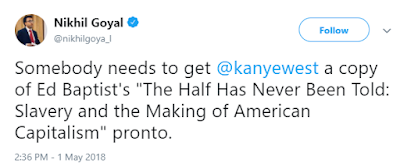The annual conference of the Economic & Business History Society is going on now in Finland. Unfortunately I was not able to go to the conference this year. It looks like they put together a great program.
They are livestreaming the keynote by Deirdre McCloskey at 10:30 eastern time.
I should also note that the society's journal Essays in Economic & Business History is now listed in the Chartered Association of Business Schools Academic Journal Guide. Congratulations to the editor, Jason Taylor, the associate editors, and the editorial board.
This is a blog about economics, history, law and other things that interest me.
Wednesday, May 30, 2018
Monday, May 14, 2018
Industrial Revelations
I think most people have a very vague notion of what the Industrial
Revolution was, and descriptions and pictures are not particularly helpful. You
really need to see a spinning wheel, a spinning jenny, and a water frame at
work to appreciate what was happening in the 1700s. I have been fortunate enough
to visit some great museums and see some of these things at work, but I don’t
have the opportunity to do that with my students. That is where Industrial Revelations
comes in handy. There are several seasons of Industrial Revelations, and I
haven’t had time to watch them all, but the first season with Mark Williams (aka
Arthur Weasley) is great for showing many important technological changes
during the Industrial Revolution. Here is a link to the textile episode,
which I think is one of the best.
Thursday, May 3, 2018
Stop Telling Kanye to Read Ed Baptist
Since Kanye West decided that the World had spent enough time
paying attention to people that are not him, I have seen a number of suggestions
for Kanye’s education. More than a few have been along these lines
If he were to read Baptist, Kanye, like many of
Baptist’s other readers, could learn all sorts of things that are not
true. He could learn that
1.
Before Ed Baptist, economists and historians did
not believe that slave owners were profit seeking capitalists. Many
historians and almost all economic historians viewed slavery as a profit
seeking enterprise.
2.
Slave produced cotton accounted for more than
60% of GDP. Baptist
made up numbers and summed them in an approach to national income accounting
that defies all logic.
3.
The pushing system was a term that enslaved
people used. Ed
Baptist made up the term (see section 4.1; on second thought, just read the
whole thing).
4.
Economic historians don’t think slave owners
used violence to coerce enslaved people. This
is simply not true.
5.
Baptist shows that innovations in violence led
to innovations in picking that drove increases in productivity during the
antebellum period. He never provides any
evidence to support one of the central claims of his book. See
the link for the previous point and this by
Pseudoerasmus, and this by Olmstead
and Rhode. I should also mention Trevor
Burnard as one of the first historians to call out Baptist.
If we want Kanye to understand the brutality of slavery, how
about Charles Ball,
or Solomon Northup,
or Harriet Jacobs?
If you think he needs to read some professor, how about Daina
Ramey Berry? Maybe if Kanye gets through these readings we can come up with
some more, but let’s not contribute to the miseducation of Kanye West by
telling him to read Ed Baptist’s terrible book.
P.S. Stop telling anyone to read Ed Baptist!
Wednesday, May 2, 2018
Thoughts on Kochs and GMU
1.
Cabrera sounds like Captain Renault. He should
have actually said that he was “shocked – shocked to find that there were deals
like this”
2.
The deals seem pretty stupid in terms of the
level of involvement that the Koch’s wanted. I say stupid because they should
have known that it would look bad when it came out, and it wasn’t necessary. As
long as the president and provost want the money to keep coming in they will
make sure the donor is happy.
3.
Provosts and presidents can do that because universities
are like schoolyards.
5.
I will continue to judge academics at George
Mason, whether they are in economics, Mercatus, the law school, or any other
department or center, based upon what they do as individuals. That means that Mark
Koyama and Noel Johnson are among the best economic historians
working now, Robin
Hanson and Arnold
Kling are willing to play fast and loose with evidence to support their
claims, and I still don’t understand why Tyler Cowen gets so much attention.
6.
This is the third time I have posted something
critical of Democracy in Chains and I still haven’t gotten any Koch money.
Subscribe to:
Posts (Atom)


